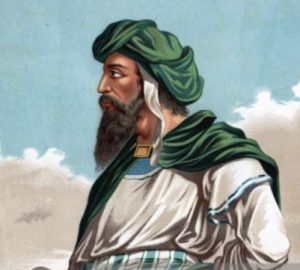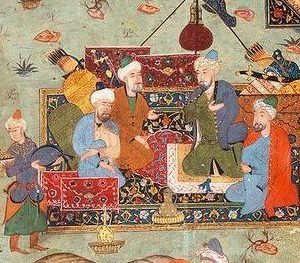One day, a dispute broke out between Abu Ja’far al-Manshur (712-775 AD), the second caliph of the Abbasids, with his empress, al-Hurrah. Disputes arose because of al-Manshur’s desire to remarry. The climax of the dispute was division (syiqaq) because of the injustice of the caliph to his wife. The wife demands justice for her.
Convinced of winning his wife’s lawsuit, al-Manshur agreed. He then asked his wife, “Who are you willing to solve this problem between us?”
The wife said, “With Imam Abu Hanifah.”
Al-Manshur also agreed to his wife’s choice. He then presented Imam Abu Hanifa (80–148 AH / 699-767 AD) to the palace. Al-Manshur said to Imam Abu Hanifah, “O Imam Abu Hanifah, my wife, al-Hurrah opposed me.”
Imam Abu Hanifah invited al-Manshur to speak, “O believers, speak.”
Al-Manshur then asked the question, “O Imam, how many women a man can marry with?”
“Four,” Imam Abu Hanifa replied briefly. Al-Manshur asked again, “And how many can he marry slave?”
“As he wishes. There is no limit to the number,” Imam Abu Hanifah said.
“Can someone argue against that provision?” he asked excitedly.
“No,” said Imam Abu Hanifah.
Hearing these answers, he was sure that the decision of Imam Abu Hanifa would be on his side. Before continuing his conversation, he glanced at his wife while smiling triumphantly. Then he continued his dialogue with Imam Abu Hanifah, “You have heard my opinions and arguments, O Sheikh. Now, what do you think about my problem? “
Imam Abu Hanifah responded with dignity, “O Abu Ja’far, Allah allows it all only for people who can be fair. Meanwhile, people who cannot do justice or worry about not being able to do justice, should not marry more than one wife. “Imam Abu Hanifah then cited an-Nisa ‘verse 3:
فَإِنْ خِفْتُمْ اَلَّا تَعْدِلُوْا فَوَاحِدَةً
“But if you fear that you will not be just, then [marry only] one or those your right hand possesses”
“It is better for us to have morality such as Allah’s morality and receive advices from Him,” Imam Abu Hanifah added.
Hearing the talk, Abu Ja’far could only be silent. The victory smile that had previously expanded slowly faded and disappeared. The mouth is locked for long enough. As if, his tongue was out of his mouth that he unable to say.
Imam Abu Hanifah went ahead to speak to ask permision to return home.
Shortly after Imam Abu Hanifah left, the servant of the caliph’s wife arrived while carrying various kinds of gifts; money, clothes, slaves, and khimar.
However, Imam Abu Hanifah refused all the gifts. To the waiter, he said, “Send my greetings to the empress. Tell her, I only defend my religion. I stand tall in that position because of Allah alone, not aiming at approaching someone or hoping to get world wealth. “
Source: Alf Qishshoh wa Qishshoh min Qashas ash-Shalihin wa as-Shalihat wa nawadir az-Zahidin waz-Zahidat karya Haniy al-Hajj.
Artikel ini juga tersedia dalam bahasa:
 Indonesian
Indonesian





